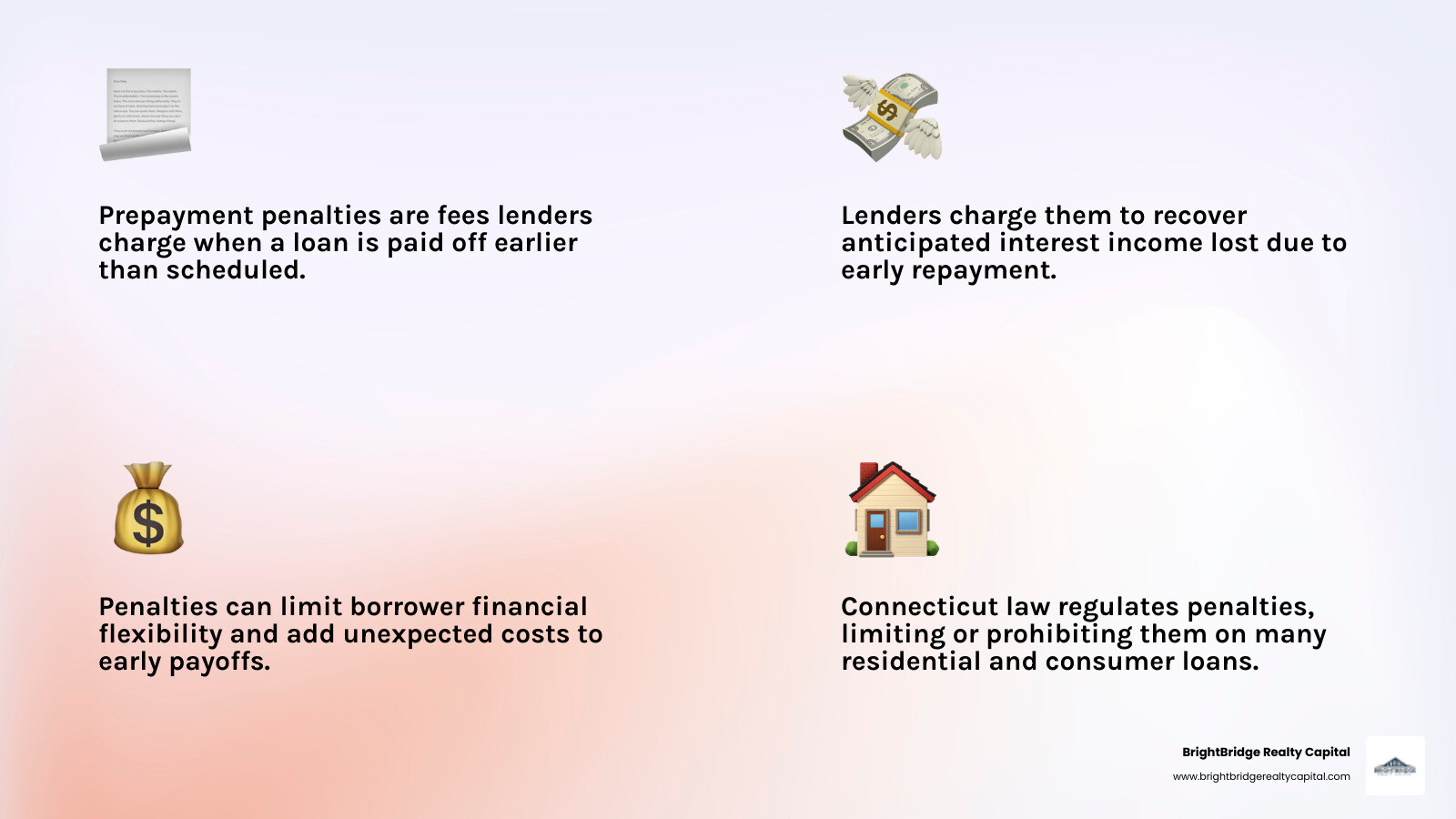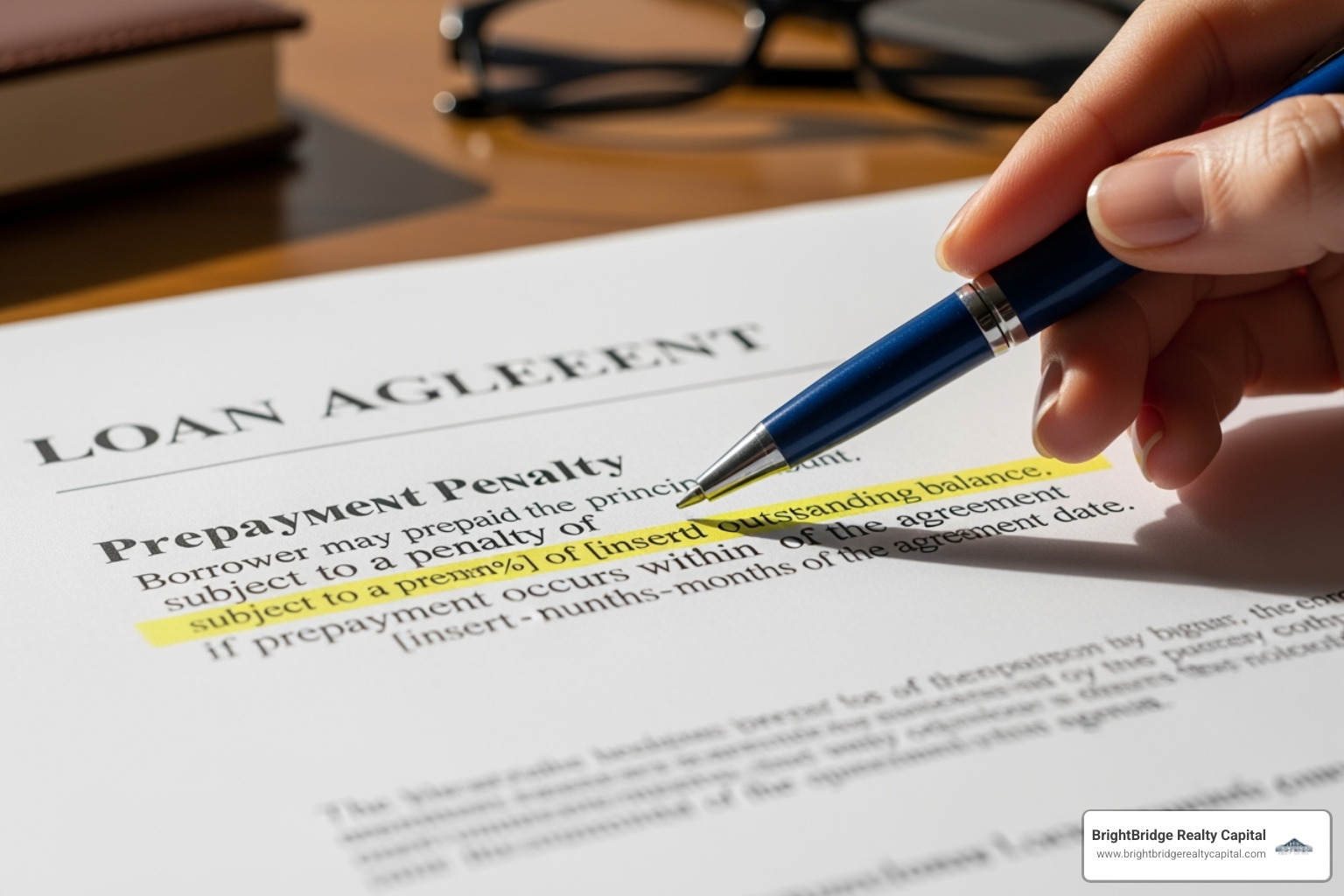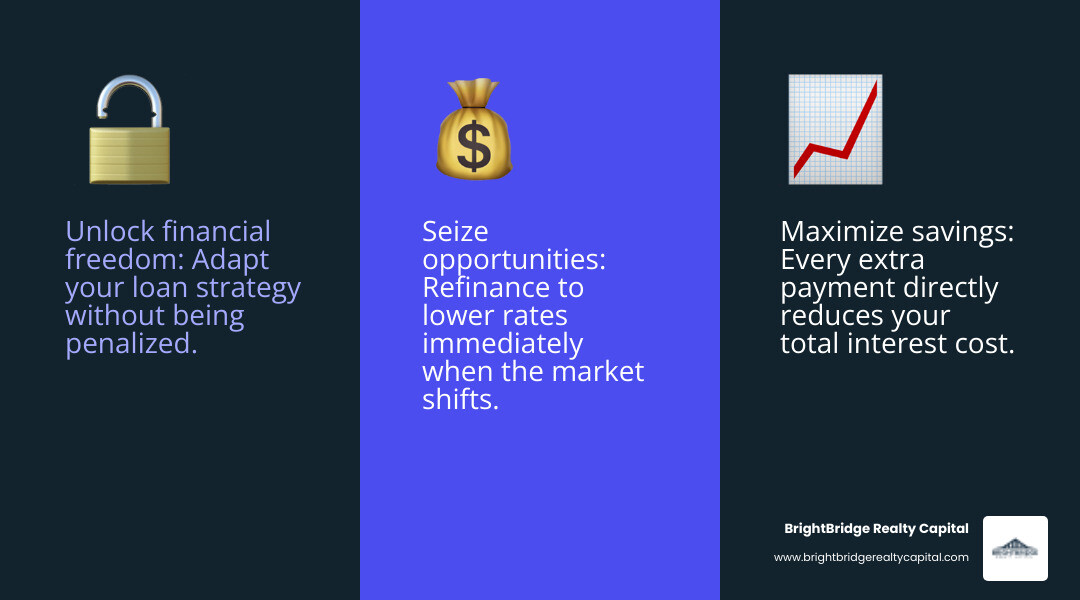Connecticut Loans: Why No Prepayment Penalties Matter

Understanding the Value of No Prepayment Penalties Connecticut Loans
In the Constitution State, securing financial freedom is as important as preserving its rich history. For any borrower, understanding the fine print of a loan agreement is paramount, and one of the most critical clauses to watch for is the prepayment penalty. A prepayment penalty is a fee that some lenders charge if you pay off all or part of your loan ahead of the agreed-upon schedule. This fee can create an unexpected financial hurdle, trapping you in a loan and limiting your ability to adapt to changing life circumstances or market conditions. Navigating the rules for no prepayment penalties Connecticut loans is essential, as the regulations are a complex mix woven from state and federal law, varying significantly by the type of loan you seek.
Here’s a more detailed overview of what to expect in Connecticut:
- Personal Loans: These are often the most flexible. Many Connecticut lenders, particularly credit unions, actively market personal loans without prepayment penalties. This gives you the freedom to use a work bonus or tax refund to eliminate debt early, whether it's for debt consolidation, a home improvement project, or another personal expense.
- Residential Mortgages: This is where consumer protections are strongest. Thanks largely to federal regulations like the Dodd-Frank Act, prepayment penalties are prohibited on the vast majority of residential mortgages, including high-cost loans, nonprime loans, and most Qualified Mortgages (QMs). This federal oversight provides a strong baseline of protection for Connecticut homeowners.
- Business & Real Estate Investor Loans: The rules shift dramatically in the commercial sphere. These loans are governed almost entirely by the terms of the contract. While some smaller business loans may be penalty-free, larger commercial real estate and investor loans frequently include significant prepayment penalties. For entrepreneurs and investors, scrutinizing and negotiating these terms is not just advisable—it's a critical component of a successful business strategy.
This comprehensive guide will help you steer these intricate rules to find the loan that best aligns with your financial objectives.
As Daniel Lopez, a loan officer at BrightBridge Realty Capital, I've dedicated my career to explaining complex financing for my clients. I've seen how a deep understanding of loan terms, especially prepayment clauses, empowers borrowers to make confident and informed decisions. My expertise lies in guiding real estate investors through the nuances of financing, ensuring that every aspect of their loan, from interest rates to exit strategies, supports their long-term financial goals.

Must-know no prepayment penalties Connecticut loans terms:
Understanding Prepayment Penalties: The "Why" and "How"
Imagine you've just received an unexpected inheritance or a significant promotion, and you want to use that windfall to pay off your mortgage or another loan early. While this sounds like a savvy financial move, some lenders will charge you a prepayment penalty for the privilege. This is a fee levied on borrowers for paying off their loan ahead of the predetermined schedule, and it can significantly diminish the financial benefits of your diligence.

From the lender’s perspective, the penalty is a tool for risk management. Lenders are in the business of earning interest over the full term of a loan. When they issue a loan, they project a certain return on their investment based on the interest payments they will receive over many years. If you repay the principal early, you cut off that future stream of interest income. This is particularly problematic for the lender in a falling interest rate environment. If rates have dropped since your loan was issued, the lender must now reinvest your returned principal at a lower, less profitable rate. The prepayment penalty is designed to help them recoup a portion of that lost, anticipated income. For borrowers, however, this fee can easily offset the interest savings you hoped to achieve. The Consumer Financial Protection Bureau (CFPB) highlights that these penalties are most common in the first few years of a loan, precisely when refinancing for a better rate is most attractive. You can learn more here: What is a prepayment penalty? | Consumer Financial Protection Bureau.
Common Situations Triggering a Penalty
Prepayment penalties don't apply to every extra payment. They are typically triggered by specific, significant events:
- Selling your home: When you sell a property, the proceeds from the sale are used to pay off the existing mortgage. If your loan has a prepayment penalty clause, this fee will be added to your total payoff amount at closing, reducing your net profit from the sale.
- Refinancing for a lower rate: This is one of the most common triggers. If you find a new loan with a better interest rate, you must first pay off your old loan. A penalty fee can make this a costly move. For example, a 2% penalty on a $300,000 remaining balance is a $6,000 fee, which could negate the first year or two of savings from your new, lower rate.
- Paying a large lump sum: Using an inheritance, bonus, or other large sum to significantly pay down your principal can also trigger a penalty. Many loan agreements specify a limit on how much you can prepay in a given year (often 20% of the outstanding balance) without incurring a fee.
While making small, extra principal payments each month generally does not trigger a penalty, it is always wise to confirm the specific terms with your lender before making any substantial extra payments to avoid unpleasant surprises.
How Penalties Are Calculated
Lenders use several methods to calculate prepayment penalties, and the specific formula will be detailed in your loan agreement:
- Percentage of the remaining balance: This is the most straightforward method. The penalty is a fixed percentage (e.g., 1-3%) of the outstanding loan balance at the time of prepayment. For instance, if you prepay a loan with a $250,000 remaining balance and a 2% penalty, you would owe a $5,000 fee.
- Number of months' interest: The penalty is calculated as the equivalent of a certain number of months' interest (e.g., three or six months). This can be complex, as it could be based on the interest of the prepaid amount or the entire outstanding balance, so reading the fine print is crucial.
- Sliding scale: Very common in mortgages that permit penalties, this method reduces the penalty over time. For example, the penalty might be 3% of the balance if you prepay in the first year, 2% in the second year, and 1% in the third year, after which it disappears entirely. This structure incentivizes borrowers to stay in the loan for at least a few years.
- Yield maintenance: This complex formula is almost exclusively used in commercial real estate loans. It is designed to ensure the lender receives their originally projected yield for the entire loan term. The calculation determines the present value of the lost interest payments that the lender would have received, factoring in the difference between your loan's interest rate and current market rates. If interest rates have fallen, the penalty can be substantial, as it compensates the lender for having to reinvest your money at a lower return.
- Defeasance: Also common in commercial real estate, defeasance is not a fee but a process. Instead of paying off the loan, the borrower replaces the loan's collateral (the property) with a portfolio of government securities (like U.S. Treasury bonds) that generates income sufficient to cover all remaining loan payments. This is a complicated and often expensive transaction that requires specialized consultants, but it allows the loan to be removed from the property, enabling a sale or refinance.
The Legal Landscape for No Prepayment Penalties Connecticut Loans
Navigating Connecticut's prepayment penalty laws requires understanding a multi-layered legal environment where state statutes and powerful federal regulations intersect, often to the borrower's benefit. While the Connecticut General Statutes provide a foundational framework, the landscape was dramatically reshaped by federal laws enacted after the 2008 financial crisis.
The most influential of these is the Dodd-Frank Wall Street Reform and Consumer Protection Act. This act tasked the Consumer Financial Protection Bureau (CFPB) with creating new rules for the mortgage industry, leading to the creation of Qualified Mortgages (QM). A QM is a loan with features designed to be safer and more understandable for consumers, such as having a debt-to-income ratio below a certain threshold and prohibiting risky features like negative amortization. A cornerstone of the QM rules is the near-total ban on prepayment penalties, which effectively eliminated them from most residential mortgages across the nation. This federal preemption sets a high bar for consumer protection that all lenders must meet.
Residential Mortgage Rules in Connecticut
If you are buying a home or refinancing a primary residence in Connecticut, the regulations are heavily weighted in your favor.
For first mortgages, the federal QM regulations are the dominant force. They prohibit prepayment penalties on the vast majority of home loans, including nearly all FHA, VA, USDA, and conventional mortgages. There is a very narrow exception: some fixed-rate QMs can have a penalty, but it is strictly limited. The penalty can only be charged within the first three years of the loan, and it is capped at 2% of the outstanding balance in the first two years and 1% in the third year. However, most lenders choose not to include them at all to remain competitive.
For second mortgages (like a home equity loan), Connecticut state law provides specific protections. Under Connecticut General Statutes § 36a-746g, any prepayment penalty on a second mortgage from a nonbank lender is capped at 5% of the prepaid balance and is prohibited entirely after the loan has been in place for three years.
For High-Cost Home Loans and Nonprime Home Loans, Connecticut law offers the strongest protection by completely prohibiting prepayment penalties. A loan is defined as "high-cost" or "nonprime" based on its annual percentage rate (APR) relative to market benchmarks. This ban is designed to shield the most vulnerable consumers from predatory lending practices.
The State Mortgage Prepayment Penalty Laws - CGA.ct.gov offers historical context, but borrowers should be aware that federal laws have evolved dramatically since its publication, making today's landscape even more consumer-friendly.
Regulations for Personal and Consumer Loans
For non-mortgage consumer debt, Connecticut borrowers will find that prepayment penalties are rare. Most financial institutions, especially credit unions and online lenders, market their personal loans as being free of prepayment penalties. This has become a key competitive feature, giving consumers the flexibility to pay off debt from a bonus, inheritance, or tax refund without incurring an extra cost. Furthermore, state-sponsored initiatives like the Connecticut Green Bank Smart-E Loans, which finance energy efficiency improvements, also explicitly feature no prepayment penalties as part of their consumer-friendly design.
What About Business and Real Estate Investor Loans?
For business, commercial real estate, and investment property loans, the regulatory environment is vastly different. Connecticut law is largely silent on prepayment penalties for these business-purpose loans, treating them as a matter of contractual negotiation between parties. The law operates under the "sophisticated borrower" doctrine, which presumes that business owners and real estate investors have the financial acumen and resources (including legal counsel) to understand and negotiate complex loan terms.
As a result, commercial real estate loans, fix-and-flip loans, and rental property loans commonly include prepayment penalties. These are often calculated using complex methods like yield maintenance or defeasance to protect the lender's long-term investment. For any business borrower or investor, due diligence is absolutely critical. You must carefully review and understand the contract and actively negotiate terms that align with your specific investment strategy, cash flow projections, and planned exit.
At BrightBridge Realty Capital, we specialize in this area. We understand that real estate investors require financing that adapts to their project timelines. Our direct lending model allows for the creation of customized terms that support your investment goals, often providing a level of flexibility on prepayment that traditional banks cannot offer.
A Borrower's Guide to Finding and Securing a Loan Without Penalties
Finding a loan in Connecticut without a prepayment penalty isn't a matter of luck; it's the result of being an informed, proactive, and diligent borrower. The power to secure favorable terms lies in knowing where to look, what to ask, and how to interpret the documents placed in front of you. This ensures you get the best possible deal for your financial situation.

Your most important tools in this process are the Loan Estimate and the Closing Disclosure. These are standardized, legally required forms designed to make loan terms clear and comparable. You receive the Loan Estimate within three days of applying for a mortgage, and it provides a detailed breakdown of the estimated costs and terms. The Closing Disclosure is provided at least three business days before you close, giving you time to review the final terms. Always compare these two documents carefully to ensure no terms have changed unexpectedly. The final, legally binding contract is the promissory note, which contains the definitive language about any penalties, sometimes located in a separate "Addendum to the Note." Scrutinizing these documents is the most critical step in understanding loan terms.
How to Identify No Prepayment Penalties Connecticut Loans
To confidently spot a loan with no prepayment penalties Connecticut loans, you must be thorough and systematic in your approach.
- Read the fine print: This cannot be overstated. On your Loan Estimate, look at Page 1 in the "Loan Terms" section. There will be a line item for "Prepayment Penalty" with a clear "YES" or "NO." On the Closing Disclosure, this information is found on Page 5 under the "Loan Calculations" section. Look for specific keywords throughout the promissory note like "prepayment," "early payment," "early closure," or "termination fee."
- Ask direct questions: Don't be passive. Engage your loan officer with a specific checklist of questions and ask for clear, unambiguous answers. Good questions include: "Does this loan have any form of prepayment penalty?" "If so, how is it calculated and for how long does it apply?" "Is there a penalty for paying off the entire loan early through a sale or a refinance?" "Are there limits on how much extra I can pay toward the principal each year without a penalty?" "Can you confirm in writing that this loan has no prepayment penalty?" Vague responses are a major red flag for loan officer communication.
- Shop lenders: Never accept the first offer you receive. Different types of lenders have different business models and loan products. Compare offers from large national banks, local community banks, nonprofit credit unions, and direct private lenders. Credit unions, being member-owned, often have more consumer-friendly terms, including a higher likelihood of no-penalty loans. At BrightBridge Realty Capital, we focus on transparent and competitive options specifically for real estate investors, understanding their unique needs.
If you find the legal language in the paperwork confusing, do not hesitate to consult a qualified financial advisor or a real estate attorney. A small investment in expert advice can save you from a costly mistake.
Loan Types That Typically Don't Have Penalties
While you must always verify the terms of your specific loan, certain loan categories are generally free of prepayment penalties due to federal regulations or prevailing industry standards.
Government-backed mortgages like FHA loans, VA loans, and USDA loans are designed to be accessible and consumer-friendly, and a core feature of these programs is the prohibition of prepayment penalties. Similarly, the vast majority of most conforming mortgages that adhere to the federal "Qualified Mortgage" (QM) rules also come without these penalties.
Beyond the mortgage world, many personal loans are proudly advertised as having no prepayment penalties Connecticut loans. This is a major selling point for lenders, especially credit unions and online platforms, who compete for customers seeking flexibility.
For real estate investors, hard money loans often fit this profile. These are short-term, asset-based loans designed for projects like fix-and-flips. The lender's business model is built on collecting high interest and fees over a short duration (typically 6-18 months) and then getting their capital back quickly to redeploy it. A prepayment penalty would be counterintuitive to this model, as it would punish the borrower for achieving the quick exit that both parties anticipate. At BrightBridge Realty Capital, we understand this dynamic and structure our loans to support, not hinder, an investor's strategy.
The Borrower's Advantage: Benefits and Common Myths
Choosing a loan with no prepayment penalties Connecticut loans is about far more than simply avoiding an extra fee; it's about strategically securing your financial autonomy and opening up a world of advantages. As a borrower, a no-penalty loan gives you greater control, agility, and peace of mind in managing your largest financial obligations.

When you can pay off a loan early without being penalized, you gain immense financial flexibility. You are not locked into a long-term commitment if your personal or financial circumstances change for the better. You can achieve significant interest savings because every dollar you pay toward principal early is a dollar that no longer accrues interest for the lender. A no-penalty loan also allows for crucial market responsiveness; if interest rates plummet, you have the freedom to refinance without a hefty penalty eating into your potential savings. This prevents the feeling of being in financial "lock-in" and provides invaluable peace of mind.
Key Benefits of No-Penalty Loans
Let's explore the tangible, real-world advantages of securing a loan without a prepayment penalty:
- Flexibility to sell: This is a game-changer for homeowners and real estate investors alike. Imagine you get a job offer in another state or, as an investor in Stamford, you finish a renovation project months ahead of schedule. A no-penalty loan allows you to sell the property at the most opportune moment and pay off the loan without being punished for your success or life changes.
- Freedom to refinance: This is where the most significant savings can occur. Suppose you bought your home in Hartford with a mortgage at a 6.5% interest rate. Two years later, market rates drop to 5%. Without a penalty, you can refinance and potentially save hundreds of dollars per month. With a 2% penalty on a $400,000 loan, you'd face an $8,000 fee, which could take years of monthly savings to recoup, making the refinance a poor financial decision.
- Pay off debt faster: If you receive a large work bonus, an inheritance, or simply start earning more, you can direct those extra funds toward your loan's principal. This accelerates your path to being debt-free, saving you tens of thousands of dollars in interest over the life of the loan and shaving years off your repayment schedule.
- Increased property equity: For homeowners and investors, paying down the principal balance faster means you build equity in your property more quickly. This equity is a powerful financial tool that can be leveraged for future investments, home improvements, or other financial goals.
Common Myths About Prepayment Penalties in Connecticut
Several persistent misunderstandings surround no prepayment penalties Connecticut loans. Let's debunk these common myths with the facts:
- Myth: They are completely illegal in CT.Reality: This is an oversimplification. While heavily restricted and prohibited on most consumer mortgages (like Qualified Mortgages) and high-cost loans, they are legally permitted on other loan types, such as some residential second mortgages (with statutory caps) and most commercial and business-purpose loans.
- Myth: All mortgages have them.Reality: This is false and largely a relic of the pre-2008 financial crisis era. Today, thanks to federal regulations, the opposite is closer to the truth for standard home loans. Most common mortgage types, including FHA, VA, USDA, and the majority of conforming conventional loans, do not have prepayment penalties.
- Myth: You can't refinance if your loan has one.Reality: You absolutely can refinance, but you must pay the penalty as part of the transaction. The critical question is whether it's financially prudent. You must perform a break-even analysis: calculate how many months it will take for the savings from your new, lower monthly payment to offset the upfront cost of the penalty. If the break-even point is too far in the future, refinancing may not be worth it.
- Myth: They apply to any and all extra payments.Reality: This is mostly false for small, regular extra payments. Penalties are typically triggered by paying off the entire loan or a very large portion of it at once. Many loan agreements that do include penalties have a provision allowing you to prepay up to 20% of the outstanding loan balance each year without triggering the fee. Always check your specific loan agreement for this detail.
Frequently Asked Questions about Connecticut Prepayment Penalties
Navigating the complexities of loan agreements can bring up many questions, especially when it comes to the fine print on prepayment penalties in Connecticut. Getting clear answers is crucial, as it can save you a significant amount of money and provide you with much-needed financial freedom. Here are detailed answers to some of the most common questions borrowers ask.
Are prepayment penalties legal on mortgages in Connecticut?
Yes, they are legal on some specific types of mortgages in Connecticut, but their use is heavily regulated and often prohibited. The answer is nuanced and depends entirely on the loan type.
For the vast majority of residential first mortgages (including conventional, FHA, VA, and USDA loans), federal "Qualified Mortgage" (QM) rules effectively forbid prepayment penalties. This is a massive protection for most homeowners. There is a narrow exception for certain fixed-rate QMs, which can have a penalty, but it's capped at 2% in the first two years and 1% in the third year, and it must disappear after year three. Most lenders avoid this to stay competitive.
For residential second mortgages from nonbank lenders, Connecticut state law applies. It caps any penalty at 5% of the principal balance being prepaid and completely prohibits them after three years from the loan's origination date.
Furthermore, Connecticut law explicitly forbids any prepayment penalties on higher-risk loan types, such as High-Cost Home Loans and Nonprime Home Loans, to protect consumers from predatory practices.
In summary, while they technically exist for a few niche mortgage products, the overwhelming majority of consumer mortgages in Connecticut are protected from these penalties, making it very common to find no prepayment penalties Connecticut loans for your home.
How can I tell if my Connecticut loan has a prepayment penalty?
The definitive answer is always in your loan documents. The easiest places to check are your Loan Estimate and Closing Disclosure. These standardized forms have a dedicated section on the first and last page, respectively, that clearly states in plain language whether a prepayment penalty "can be charged," for how long it applies, and the maximum amount.
The ultimate legal authority is your Promissory Note, the document containing your legal promise to repay the loan. You must read this document carefully, looking for a section titled "Prepayment" or "Borrower's Right to Prepay." Sometimes, these details are contained in a separate document called an "Addendum to the Note," so be sure to review all paperwork you sign at closing.
If you remain unsure after reviewing your documents, your first step should be to call your lender and ask your loan officer for a direct, unambiguous confirmation. For legal clarification, consulting with a real estate attorney is the best course of action.
Do real estate investor loans in Connecticut have prepayment penalties?
Yes, this is the category where prepayment penalties are not only common but often expected. Unlike consumer mortgages, loans for business purposes—such as fix-and-flip loans, bridge loans, and rental property loans—are not subject to the same strict consumer protection regulations regarding penalties.
Lenders include these clauses to protect their expected return on investment. A commercial loan is a significant investment for a lender, and if it's paid off early, especially in a falling interest rate environment, their projected profit is lost. The penalty helps mitigate this risk. However, not all investor loans are created equal. Some lenders who specialize in short-term financing for investors, like many hard money lenders, may offer loans with no prepayment penalties or very short penalty periods (e.g., 3-6 months). They understand that an investor's business model relies on a quick exit.
For real estate investors, this means due diligence and negotiation are paramount. You must read your loan agreement carefully and discuss prepayment terms with your lender upfront. Negotiating a shorter penalty period, a lower fee, or its complete removal can have a significant positive impact on your project's profitability. At BrightBridge Realty Capital, we work with investors to provide financing solutions that align with their project goals and need for flexible repayment options.
What is the difference between a 'hard' and a 'soft' prepayment penalty?
This is an important distinction, especially in the non-QM and commercial loan space. A hard prepayment penalty means the fee applies if you pay off the loan early for any reason, whether you are refinancing the loan or selling the property. A soft prepayment penalty, which is more borrower-friendly, typically only applies if you pay off the loan by refinancing it with a new loan. If you sell the property, the penalty is waived. When negotiating, asking for a soft penalty instead of a hard one can be a valuable compromise, as it preserves your flexibility to sell the asset without a fee.
Are there any advantages to accepting a loan with a prepayment penalty?
While generally disadvantageous, there can be a specific trade-off. Occasionally, a lender may be willing to offer a slightly lower interest rate in exchange for the borrower accepting a prepayment penalty clause. The penalty provides the lender with more security regarding their return on investment, and they may pass a small portion of that benefit to the borrower in the form of a lower rate. This creates a choice for the borrower: Is a lower monthly payment more valuable than the flexibility to exit the loan early without a fee? If you are absolutely certain you will not be moving, selling, or refinancing for the duration of the penalty period, this trade-off might be worth considering. However, for most borrowers, the financial flexibility of a no-penalty loan outweighs the minor rate reduction.
Conclusion: Taking Control of Your Connecticut Financing
Navigating no prepayment penalties Connecticut loans is not only possible but is a crucial skill for any savvy borrower in the state. While the term "prepayment penalty" can sound intimidating, a combination of robust federal regulations and competitive market practices means that borrowers are often in a position of strength. The power to secure the best terms lies in being educated, diligent, and assertive.
Due diligence is your most essential tool. Carefully reviewing your Loan Estimate and Closing Disclosure, asking your lender direct and specific questions, and comparing offers from a variety of institutions are non-negotiable steps that can save you thousands of dollars and prevent future financial constraints. For most borrowers, the path to a penalty-free loan is clearer than ever before.
Here are the key takeaways for different borrowers:
- For Homeowners: Federal Qualified Mortgage rules have largely eliminated these penalties on standard home loans. The law is on your side, but you must still verify the details in your documents to ensure you are protected.
- For Personal Loan Borrowers: The market is highly competitive. You have numerous penalty-free options, especially from credit unions and online lenders. Shop around to find the most flexible terms.
- For Real Estate Investors: You operate in a different landscape where penalties are common and contractual. For you, negotiation and strategic planning are critical. Aligning your loan's prepayment terms with your investment timeline and exit strategy is fundamental to maximizing your return on investment.
Financial flexibility is invaluable. A loan without a prepayment penalty is more than just a loan; it's a tool that allows you to adapt to a dynamic market and evolving life circumstances. It gives you the freedom to refinance when rates drop, to sell a property when the time is right, or to accelerate your journey to being debt-free. This freedom is essential for long-term financial health and success.
At BrightBridge Realty Capital, we are committed to the principle that the right financing terms can make or break an investment. We provide transparent, flexible, and customized solutions designed specifically for the needs of real estate investors, because we understand that in your world, timing and flexibility are everything.
Take control of your financing journey. Use the knowledge from this guide to ask the right questions, scrutinize the fine print, and choose a loan that empowers you to achieve your goals on your own terms.



